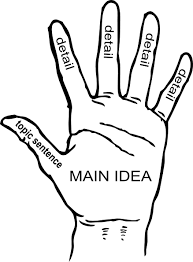Main Idea
The main idea of a passage or reading is the central thought or message. In contrast to the term topic, which refers to the subject under discussion, the term main idea refers to the point or thought being expressed. The difference between a topic and a main idea will become clearer to you if you imagine yourself overhearing a conversation in which your name is repeatedly mentioned. 
When you ask your friends what they were discussing, they say they were talking about you. At that point, you have the topic but not the main idea. Undoubtedly, you wouldn’t be satisfied until you learned what your friends were saying about this particular topic. You would probably pester them until you knew the main idea, until you knew, that is, exactly what they were saying about your personality, appearance, or behavior. The same principle applies to reading. The topic is seldom enough.
You also need to discover the main idea.
Reading Tips: 
1. As soon as you can define the topic, ask yourself “What general point does the author want to make about this topic?” Once you can answer that question, you have more than likely found the main idea.
2. Most main ideas are stated or suggested early on in a reading; pay special attention to the first third of any passage, article, or chapter. That’s where you are likely to get the best statement or clearest expression of the main idea.
3. Pay attention to any idea that is repeated in different ways. If an author returns to the same thought in several different sentences or paragraphs, that idea is the main or central thought under discussion.
4. Once you feel sure you have found the main idea, test it. Ask yourself if the examples, reasons, statistics, studies, and facts included in the reading lend themselves as evidence or explanation in support of the main idea you have in mind. If they do, your comprehension is right on target. If they don’t, you might want to revise your first notion about the author’s main idea.
5. The main idea of a passage can be expressed any number of ways. For example, you and your roommate might come up with the same main idea for a reading, but the language in which that idea is expressed would probably be different. When, however, you are asked to find the topic sentence, you are being asked to find the statement that expresses the main idea in the author’s words. Any number of people can come up with the main idea for a passage, but only the author of the passage can create the topic sentence.
6. If you are taking a test that asks you to find the thesis or theme of a reading, don’t let the terms confuse you, you are still looking for the main idea.
A Minor Sentence is one that does not necessarily have a main verb in it, but which can be understood as a complete unit of meaning.
No comments:
Post a Comment